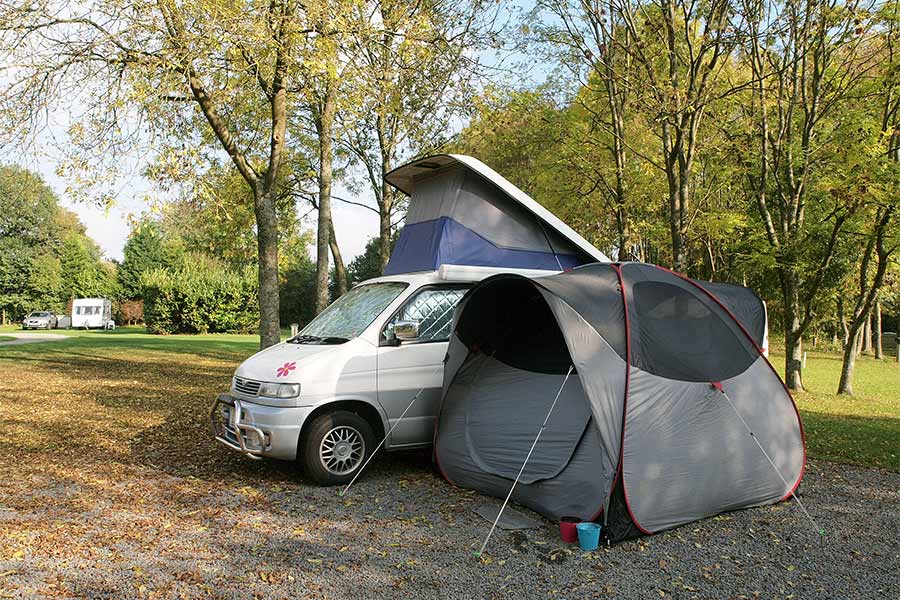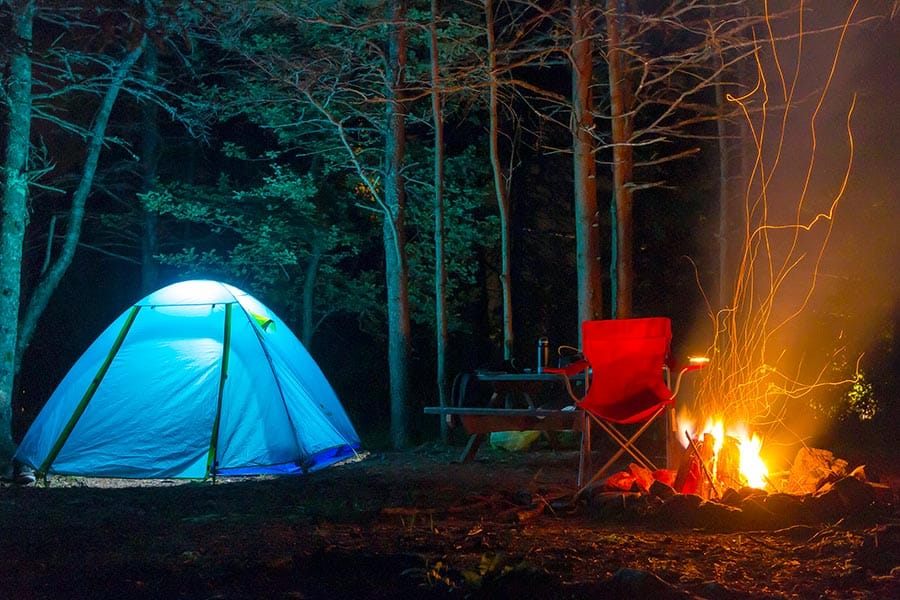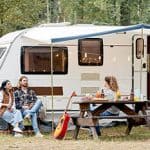
Camping is an outdoor activity that involves sleeping outside, in a shelter like a tent or a van. Camping has become more popular as more people have a desire to disconnect and enjoy the great outdoors. From taking a night away from home to deciding to travel around the country, camping is a great recreational activity.
To determine if van camping or tent camping is better for you, you have to consider the following preferences:
| Van Camping: | Tent Camping: |
|---|---|
| You want to camp but not outside all the time | You don’t mind getting dirty |
| You have the extra money to maintain a camper van |
You don’t want the expense of a van camper |
| You have the storage for a camper van | You want to enjoy the woods and nature |
| You want to camp without losing out on warmth, comfort, and running water |
You don’t get sore from sleeping on the ground |
| You are traveling a long distance | You like to hike to your campsites |
The style of camping that is best for you depends on what you like, whether you prefer extra shelter, if you can afford the additional expenses that come with a van, and the amount of time you plan on camping. This post will discuss the differences between van camping and tent camping to help you to decide which is best for you.
Van Camping – Pros and Cons
Van camping is precisely what the name suggests – camping in a van. This allows campers to travel with their beds and camping gear without worrying about finding a place to pitch a tent or to set up. Van camping is best for people who don’t want to give up the comfort of their home but also want to enjoy nature.
Pros of Van Camping
Van camping has many advantages and, depending on your age and camping preferences, you may find that the pros outweigh the cons. For example, van camping is more beneficial for older adults because of the extra comfort and accessibility. Having an actual mattress in a van to sleep on is much more comfortable than sleeping on the ground in a tent.
Other advantages are:
- Some camping vans come equipped with a kitchen and a bathroom, which makes it easier for people not to have to walk a distance to find a bathroom or have to use a public shower.
- The kitchen allows people to store food without needing to worry about a cooler as well as having an area to cook.
- Camping vans that have a kitchen and sink give you a place to clean any dirty dishes.
- You sleep off the ground versus on the ground in a tent where weather conditions may get in.
- You can always find a place to stay because, even if everywhere is full, you can park on the side of the road. With tents, you have to worry about finding an area that will fit a tent and an area that is not too bumpy or slanted.
- Vans provide extra shelter.
- There is no hassle of setting up camp when you get to where you are going.
- You have much more space for storage.
- You don’t have to carry all your equipment around with you.
- You have extra safety. When you are camping in the wilderness, it is common for people to have encounters with wildlife being curious about your site or food. Keeping your food safe inside a van will prevent the curious critters from stealing.
- You don’t run into the risk of wind blowing over your van.
- Don’t run into the risk of coming in contact with unwanted bacteria that a public restroom and shower may have.
Cons of Van Camping
Although there are many pros to van camping, there are a few cons that can prevent you from choosing this type of camping. Depending on the van model that you choose, there may be more or fewer cons.
The cons can include:
- You will need access to water and dumping stations to fill and empty the tanks; otherwise, the amenities can not be used.
- It is not suitable for most off-road travel.
- There are added gas costs.
- You need an RV site at a campground, which can be more expensive.
- Extra expenses can include insurance, registration, maintenance, campsite fees, storage fees, the price of the van, and sometimes wastewater fees.
- Depending on the size of your camping van, it may be challenging to move around and try to park.
To learn more about the costs of owning a camper van, read our post “Are Camper Vans Expensive To Run? Let’s Break It Down.”
If you are planning to use the sink, water, and bathroom of your van, you will most likely need to set up at a campground site. If you do not plan on using those features, then you can still travel wherever you want with your van.
Many people use conversion camper vans that have a bed and storage for food and other camping needs and use a campground’s bathroom and shower. However, one of the disadvantages of a camper van is the maneuverability, most people like to convert their regular vans into camping vans, which allows them to maneuver around with ease.
If you plan on going to only one campsite, then the gas may not pose as much of a problem as if you were traveling to several places. Gas is also less expensive in conversion camper vans.
Renting A Camper Van
If you are unsure if you want to purchase a camper van or wish to camp for a couple of nights in the luxury of a camper van without owning one, you can rent a camper van. You would typically pay between $100 and $200 per night, depending on the model.
We have a post that goes into whether you should buy or rent a camper van that will give you further information on which option might be the best in your situation.
Tent Camping – Pros and Cons
Tent camping is great for people who are wanting to camp out for one night without having a lot of equipment to deal with, backpackers who are traveling off the beaten path and need shelter, and for people who like to spend time outdoors.
Pros of Tent Camping
Tent camping is the type of camping that people will think about when they think of camping the old-fashioned way. Camping this way is low cost and can require minimal equipment (unless, of course, you plan on ‘glamping’). You need your tent pieces, sleeping bags, or an optional sleeping pad, and you are all set.
If you are big into backpacking, tent camping is an excellent idea because small backpacking tents are easy to carry and allows you to hike to areas that are not accessible to cars. Going this route will enable you to take advantage of beautiful views.
If you are camping at a campground, tenting is very easy because a tent is small enough to fit anywhere. Campgrounds also typically have level areas for tenters and van campers to have a suitable place, so that is not an issue you would have to worry about.
You’ll find many people choosing the traditional way of camping because of the benefits it entails.
- If you are traveling around, setting up camp at different sites, it will be cheaper to use a tent and save you money on the gas it would cost to fill up a camping van.
- They are easy to pack up and are very portable.
- It allows you to be more connected to nature. If you ask people today what real camping is, they would say it is camping in a tent. Camping in a tent gives you that outdoorsy feel.
- Depending on the size of the tent you have, you may be able to fit a mattress or air mattress into it to provide you with more comfort.
For information on various ways of inflating an air mattress, read our post here.
- Larger tents can allow you and the whole family to fit into the same tent, which will lead to the family feeling more connected.
- There are many different tents to accommodate any need. For instance, if weather conditions are expected to be windier, it is recommended to use a smaller tent to help prevent it from blowing over.
- Many people choose tent camping over van camping because it is an easy way to feel more connected with their family. What’s better than cozying up to your family in a tent?
Cons of Tent Camping
Although feeling connected to family and nature sounds nice, there are a few cons of tent camping that steers people away from it. Those cons are:
- When tent camping, especially in the woods, you run the risk of having an encounter with wild animals. Bears are known for invading campsites and getting into people’s food. However, if you are in a campground where there are usually lots of people, wildlife will tend to stay away.
- When you sleep in a tent, you are technically sleeping on the ground, which can be very uncomfortable. People will lay down sleeping bags for some cushion, but most older adults still complain about it being rough on their bodies. One option is to blow up an air mattress if you have a tent that is large enough to fit one.
- Some tents claim to be weatherproof, but that won’t stop rain from getting inside the tent. Heavy winds can also blow the tent around, especially if it is not appropriately secured.
- It can take a long time to set up. You have to find the right place to put it and make sure all the pieces are in place securely, and that can be time-consuming. At the end of your camping trip, you have to take down the tent and pack it back up.
- Having to assemble and disassemble your tent can be a hassle if you are traveling to multiple areas.
- When camping in a tent, you don’t have the luxury of your bathroom. So you would either have to squat in the woods or use a public restroom.
- Camping is a buggy experience, and if you are not cautious about keeping your tent closed, bugs, like mosquitos, can get inside and bother you. No one wants to hear buzzing while they are trying to sleep.
- Unless you are traveling with a grill, cooking can be difficult. You can either build a fire to cook or bring foods along that do not require cooking. Something else to think about is that with cooking comes dirty dishes, and tents don’t have a sink for you to wash your dishes. You would have to use a campground sink to wash your dishes, and some camps do not allow you to use your dish soap.
Other Posts of Interest
- 11 Perfect Places To Camp in White Mountain National Forest
- What Is An Inverter? Why Would I Want One In My DIY Van Build?
- 11 Ways to Stop Condensation When Sleeping in a Van
- How To Clean Your Camping Stove And Burners: 16 Tips That Work
Different Kinds Of Camper Vans
Camper vans are in the Class B group of recreational vehicles. These vehicles are a mid-size camping option, usually 17 to 23 feet long. Camper vans are available in two main types – low top camper vans and high top camper vans.
The major difference between the two is the height of the top. A high top camper van offers additional vertical space while a low top camper van is more compact.
High top camper vans allow you to stand up comfortably and can fit up to five people. They will usually have a full dining area in the back where you can sit, and you would either sleep at the top or bottom. The fridge and microwave are usually located near the front of the van.
A low top camper van is typically made to sleep two people and is more budget-friendly. In the back is where the sink and fridge are usually located, but there is not an area to sit.
There are also rising roof camper vans that have a roof that raises, exposing fabric sides that allow you to have more headspace. Most camper vans do not offer a shower and bathroom, but they do exist.
Popular Camper Vans
These camper vans are popular ones you will often see on the road. Some are designed just for sleeping, and some have a pop-top roof that allows for more space and comfort.
- Volkswagen California Camper Van – Includes the pop-top roof that sleeps four people comfortably. Removable camping table and chairs.
- RB Components Sawtooth Touring Van – Features a full-sized awning and a large water tank, kitchen, bathroom, and dining areas.
- Winnebago Revel 4×4 – Roof-mounted solar panels to give you an electrical system that powers a stove, fridge, heater, and lights. It also includes a large water tank.
- Fiat Ducato Camper Van – Offers factory customization with over 600 possible layouts. Optimal turning radius and ample storage space.
- Outside Van Wanderlust – Affordable camper van with sink, shower, and kitchen.
- Peugeot Rifter 4×4 Concept – Includes a roof-mounted sleeping tent with plenty of space.
- Hymercar Camper Van – Customizable to include a bathroom, refrigerator, pop-top roof, and safety features.
Camper Van Conversions
Many people choose to take their regular-sized van and convert it into a camper van so that they can drive it like a regular vehicle day to day and use it as a camper while traveling.
Buying a camper van that already comes equipped with everything you need can come with a pretty high price, so a lot of people choose to use a van they may already have or purchase a lower-cost one to do a DIY conversion.
Some of the top vans popular for conversions in the van camping world include the following:
- Ram ProMaster
- Mercedes-Benz Sprinter
- GMC Savana
- Ford Transit
- Chevy Express
- Nissan NV
Many van campers want a van that they can convert to use specifically for van camping, and they don’t use them for any other purpose. They don’t have to remove items, and the van is always ready to go.
However, others may wish to have a van that they can camp in that doubles as an everyday vehicle. People may be doing this for financial reasons, or maybe they only camp a few weekends in the year.
Going this route isn’t going to be as expensive, and any additions will be easily removable so that the van is easy to pack up for camping and easy to unpack to go back to everyday use.
This shows that van camping does not have to be an expensive process, and anyone can easily accomplish van life.

What You Need For Tent Camping
To go tent camping, you need to have specific tools and gear just for the tent itself. The need for extra supplies may help you decide whether or not tent camping is the right choice for you.
Supplies needed:
- Tent
- Flashlight
- Mallet and tent stakes
- Extra tent stakes
- A tarp, for added protection under the tent
- Extra rope
Along with the basic needs of a tent, you may also want to bring additional supplies to make your camping trip more comfortable.
- Air mattress
- Sleeping bags and bedding
- Battery-operated lantern
- Toilet paper
When tent camping, you only have the heat of the fire, so you will want to pack extra-warm clothes and dress in layers. A rain jacket or poncho is also beneficial.
Different Kinds Of Tents
Tents come in many different shapes, sizes, and colors. Some tents are designed to handle a multitude of weather conditions, and there are ones that have multiple rooms to house an entire family. Whatever your needs are, there’s probably a tent that can fulfill them.
Some kinds of tents are:
- Dome tents
- A-Frame tents
- Multi-room tents
- Backpacking tents
- Geodesic tents
- Pop-up tents
1. Dome Tents
This is the most common tent today. These tents have two poles that cross in the middle and bend down to reach the corners of the tent, making the shape of a dome.
A rainfly is designed at the top to help protect against different weather conditions. The dome shape allows for rain to fall off instead of collecting at the top. Some dome-shaped tents have a vestibule in the front of the door that serves the purpose of a mudroom to keep any dirty gear out.
This style of tent is effortless to set up and easy to camp in because of its high center point that gives the right amount of headspace.
Pros include:
- Lightweight
- Decent headroom
- Easy to set up
Cons include:
- Catches wind easily
- Limited size
Some great dome tents are:
2. A-Frame Tents
These are the tents that are shaped like an A and were very popular in the past. These tents were initially made with canvas material and supported by a steel pole on both ends.
The main framework of an A-frame tent is made with two thick poles on each end with ropes tied at each end and then staked into the ground. Larger A-frame tents will have another support pole in the middle.
Pros include:
- Easy to set up
- Durable
- Different sizes
Cons include:
- Heavy
- Not much space
- Bulky packaging
Some A-frame tents are:
3. Multi-Room Tents
Multi-room tents are houses but in tent form, perfect for a family that needs separate rooms. The extra rooms provide extra privacy or extra storage space so that you can keep your gear in its area.
This type of tent is also great for couples who are traveling together and would like to share a tent but not sleep close together. Multi-room tents usually have from two to five rooms that are separated by a divider.
Pitching these tents is harder and takes a little bit more practice than pitching up a regular-sized tent.
Pros include:
- Plenty of space
- Privacy
- Multiple rooms
Cons include:
- Can’t handle high winds
- Heavy
- Harder to set up
- More challenging to pack up
Quality multi-room tents include:
4. Backpacking Tents
Backpacking tents are perfect for hikers who are planning to hike and pitch a tent on a mountain. They are also ideal for backpackers who are traveling a long distance and will need shelter from time to time.
These tents are smaller in size, lightweight, and very durable. Finding a lightweight tent that can handle multiple weather conditions is an essential factor.
Because backpacking tents are smaller in size, they are typically designed to shelter one to two people. These backpacking tents are made to travel, so they are ready to handle any weather.
Pros include:
- Durable
- Lightweight
- Weatherproof
- Easy setup
- Easy to transport
Cons include:
- Low height
- Limited capacity
- Made in only small sizes
Here are some useful backpacking tents:
5. Geodesic Tents
Geodesic tents are tents that are made with more shapes to them, and they showcase the progression of tent designs throughout the years. These tents are ideal for long-distance backpackers who are planning on encountering high winds and heavy snow or rain.
The design of a geodesic tent is to add extra stability to dome tents. The poles of the tent cross over each other multiple times to form triangles that add support from high winds and weather.
Although geodesic tents have the most shape and support, there are also semi-geodesic tents that require fewer poles but provide less stability.
Pros include:
- Extra stable
- Supportive
- Good headspace
- Durable
- Good for high winds
Cons include:
- Larger to travel with
- Harder to pitch
- Limited in size
Some popular geodesic tents are:
6. Pop-Up Tents
Pop-up tents are beginning to grow in popularity, especially by festival-goers, because of their spring-loaded poles that easily pop up putting the tent together.
These tents are designed to be lightweight and quick to set up but are also not made to handle rough weather conditions. Pop-up tents serve the purpose of being convenient and great for last-minute plans.
Pros include:
- Speedy setup
- Small packaging
Cons include:
- Can’t handle wind
- Low stability
- Not for lengthy camping
A couple of great pop-up tent options are:
Summing It All Up
When deciding which kind of camping is better for you, you need to analyze what you want to get out of your camping trip. You should also consider what kind of camper you are because some people enjoy the idea of camping with a tent, but do not enjoy sleeping on the ground.
Your best camping option depends on personal preference, budget, and where you are planning on camping. Backpackers who like to camp off trails or on a mountain will benefit from tent camping.
People who prefer to be comfortable, have their own bathroom, and extra space will benefit from van camping. Campers who are looking for the cheapest option should opt for a tent.






